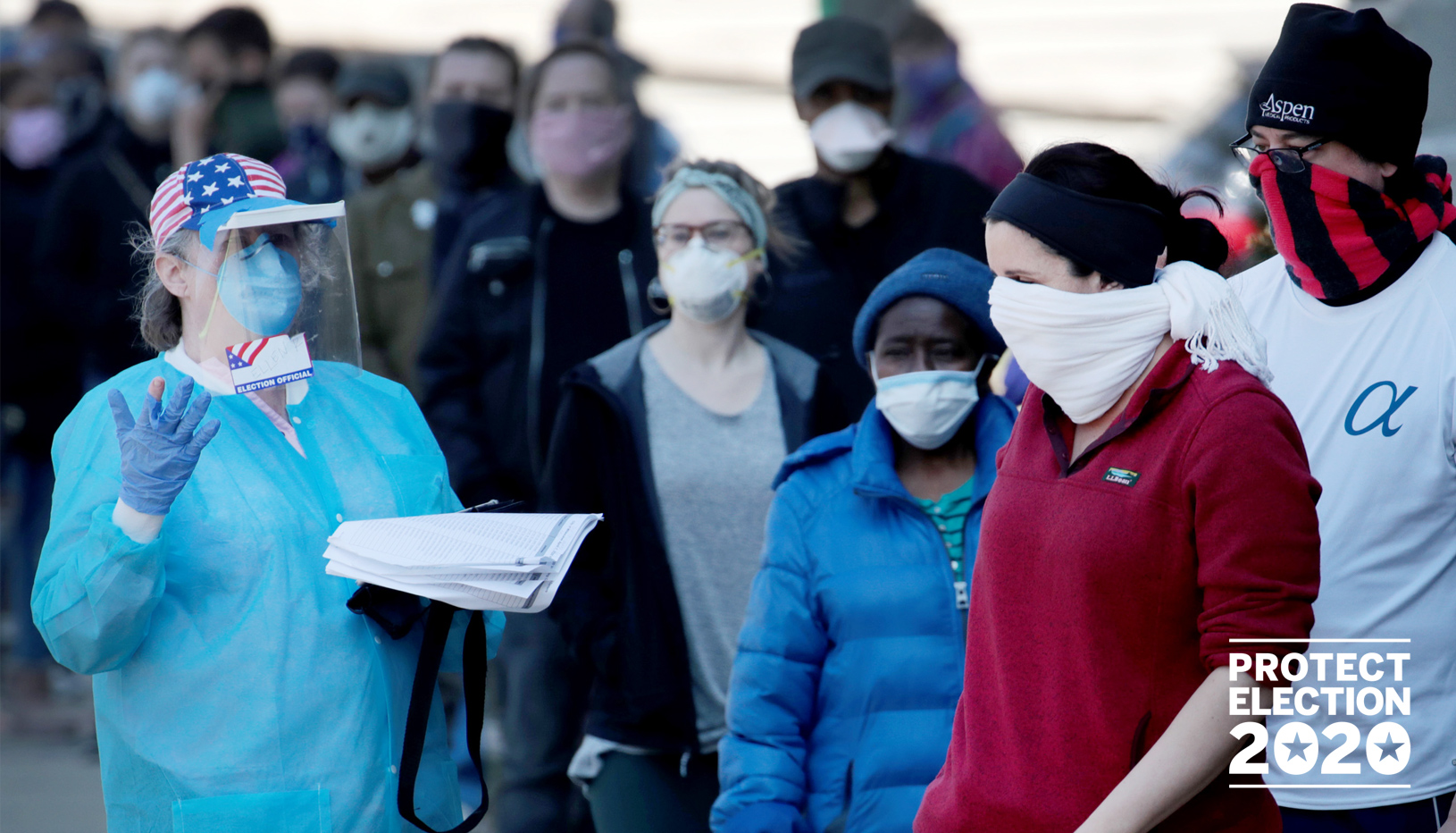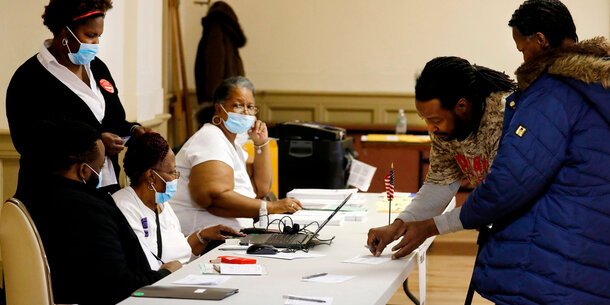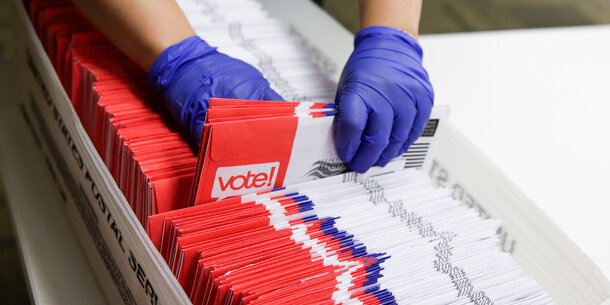Overview
No American should have to choose between their health and their right to vote. Yet our election system is woefully unprepared to run safe and fair elections this November in the midst of a pandemic. It is critical that we invest now to ensure that our state and local election systems make the adjustments and preparations needed to run the 2020 elections while protecting public health.
The Brennan Center has put together comprehensive plans to ensure the 2020 election is free, fair, safe, secure, and accessible to all. At a broad level, the solutions include expanding online voter registration and other remote registration tools, ensuring that every American can vote by a mail ballot if they want to, expanding early voting, and ensuring sufficient safe and sanitary options for in-person voting, a feature that is critically important to communities of color and others.
The most urgent need now is for Congress to appropriate enough money so state and local election officials can make the necessary changes and adjustments before November. At the same time, states must take immediate steps to ensure that every voter can safely participate by mail or in person and to prevent widespread voter disenfranchisement and widespread election meltdowns at a scale much larger than seen so far in the primaries. They must adjust their rules to ensure that no voter is left behind — especially in light of the dramatic racial disparities in voting access seen in the primaries. And they must ensure that the election system is secure and resilient in the face of ongoing attacks by foreign adversaries.
Here are the Brennan Center’s key resources about protecting the vote in 2020 from the coronavirus:
The Plan
How to Protect the 2020 Vote from the Coronavirus
The Brennan Center’s plan, which covers:
- Polling place modification and preparation
- Expanded early voting
- Making vote-by-mail a universal option
- Voter registration modification and preparation, including online registration
- Voter education
- Manipulation prevention
- Should Mail Voting Be Expanded?: Op-ed by Wendy Weiser in Newsweek
- Saving Democracy from the Coronavirus: Op-ed by Michael Waldman and Wendy Weiser in Los Angeles Times
- What It Will Take to Protect the 2020 Election: Op-ed by Wendy Weiser and Larry Norden in Politico
- Statement by Wendy Weiser before the House Homeland Security Committee: Election Security & Integrity During a Pandemic (forum video)
- Testimony by Myrna Pérez before the House Judiciary Committee: Protecting the Right to Vote During the COVID-19 Pandemic (hearing video)
- Testimony by Lawrence Norden to the House Administration Committee: The Impact of COVID-19 on Voting Rights and Election Administration (hearing video)
State Policies and Infrastructure
Preparing Your State for an Election Under Pandemic Conditions
50-state breakdown of the policies states have and what they still need to best protect the November 2020 election from Covid-19, such as online voter registration, in-person voting, mail-ballot voting, and the counting of mail ballots
Preparing Election 2020 from Covid-19: Toolkits for Activists Across the Nation
State-by-state toolkits to provide activists with the information they need to fight back against the threat Covid-19 poses to the November election
The Roadmap to the Official Count in an Unprecedented Election
Roadmap to the administrative steps election officials take to ensure that the vote count and final results are accurate
When Voting by Mail Switches to Voting in Person
Steps that voters and election officials can take to keep the election running smoothly when voters switch between vote methods
Mail Voting
The False Narrative of Vote-by-Mail Fraud
Outlines security measures in absentee and mail balloting, and debunks claims of widespread fraud in voting by mail
How Security Features Prevent Vote-by-Mail Misconduct
A detailed assessment of the numerous safeguards in place that prevent voter fraud related to mail ballots
Mail Voting: What Has Changed in 2020
Changes made to election laws and procedures concerning mail voting during 2020
Bipartisan Support for Expanded Mail Voting in 2020 Elections
Examples of party leaders, elected officials, and election officials from the major parties who advocate for expanded mail voting in the face of the pandemic
Americans of All Stripes Want a Mail Ballot Option
Public opinion poll showing that a majority of Americans of both parties support a universal vote-by-mail option
Who’s Requesting Mail Ballots in Georgia’s Upcoming Primary?
Analysis showing significant racial, age, and party disparities in absentee ballot requests processed in Georgia for the June primary
Voter Purges in an Increasingly Vote-by-Mail World
Guidelines for election officials to ensure that purges of voter rolls don’t disenfranchise eligible voters, especially in light of the increased reliance on mail voting
Covid-19 Should Be a Legitimate ‘Excuse’ to Vote by Mail
In the 16 states that require an excuse to vote by mail, fear of the coronavirus should become an acceptable reason for receiving a mail ballot for the November election
Polling Places
Guidelines for Healthy In-Person Voting
A detailed guide to minimize the risk of transmitting Covid-19 at polls this November
Voters Should Not Be Intimidated
An explainer of the strict limits on what the military, law enforcement, and poll watchers can do at the polls
Limits on Observers and Challengers at the Polls
A guide to the numerous state laws on poll watchers that control who they are and what they can do
Voters Need Safe and Sanitary In-Person Voting Options
Provides a snapshot of the Americans who can’t vote by mail and urges states to offer meaningful access to safe polling locations
Waiting to Vote
Study showing Black and Latino voters across the country waited longer to vote in 2018 than white voters
Did Consolidating Polling Places in Milwaukee Depress Turnout?
Analysis of voter turnout in Milwaukee during the Wisconsin primary shows that having fewer polling places in the city reduced overall turnout by 8.6 percent (compared to the 2016 primary) and turnout of Black voters by 10.2 percent
Changes in Election Administration and the Cost
Ensuring Safe Elections
Study estimating the costs of administering Covid-19-safe elections in 2020 in each of five states (Georgia, Michigan, Missouri, Ohio, and Pennsylvania), co-authored by the R Street Institute, the Alliance for Securing Democracy, and the University of Pittsburgh Institute for Cyber Law, Policy, and Security
What Federal Money Can Still Achieve This Election Season
Why Congress still can and should provide additional funding to state and local election officials ahead of November
Estimated Costs of Covid-19 Election Resiliency Measures
Preliminary cost estimates for adapting the country’s voting systems and practices to protect the 2020 elections from the Covid-19 pandemic
Preparing for Election Day: Deadlines for Running a Safe Election
Imminent deadlines that election officials must meet in order to purchase, acquire, and test equipment and supplies necessary run a safe and secure election in November
Election Officials, National Security Experts, and Business Leaders’ Support Federal Funding for Elections
Letters to Congress and op-eds by election officials, public health and national security experts, and business leaders across the country asking for more federal funding to cover coronavirus-related election expenses
How Businesses Can Support a Safe, Accessible, and Secure Election
A guide to how the business community can leverage its resources and influences to help ensure election officials are prepared for November and that voters have access to safe voting options
Election Security
Our Election System Is Resilient — but Still Has Room for Improvement
What states have done and what more they can do to make safeguards that protect against cyberattacks and technical problems more secure ahead of November
Preparing for Cyberattacks and Technical Problems During the Pandemic: A Guide for Election Officials
Details steps election officials must take to ensure safe and secure elections in the midst of a pandemic
To Avoid an Election Meltdown, Officials Must Stockpile Backup Paper Ballots
Guidelines for election officials on sufficient backup paper ballot stockpiles
Why Online Voting Isn’t the Answer to Running Elections During Covid-19
Explains why voting should not be done online — it is not secure enough
Disinformation
Trump Targets Michigan to Push His Latest Lie on Imagined Mail-in Voting Fraud
Voting by mail is an essential option for a safe and fair election during Covid-19, but the president insists on lies.
10 Voter Fraud Lies Debunked
We debunk 10 of the most egregious voter fraud claims of the past five years.
Dirty Tricks: Eight Falsehoods that Could Undermine the 2020 Election
Here are eight lies, misconceptions, and false arguments that we think voters will have to contend with in 2020.
Other resources
- Election Officials Spent Four Years Beefing up Voting Security. It Paid Off: Op-ed by Larry Norden and Gowri Ramachandran in Slate
- 6 Reasons Not to Panic About the Election: Op-ed by Wendy Weiser and Michael Waldman in Politico
- US elections need a fundamental reboot: Op-ed by Wendy Weiser in the Boston Globe
- Talking Election Problems with the Brennan Center: Interview with Derek Tisler in FiveThirtyEight
- Talking Election Law with the Brennan Center: Interview with Wendy Weiser in FiveThirtyEight
- Let the Private Sector Help Save the Election. We Have No Choice: Op-ed by Wendy Weiser and Jennifer Weiss-Wolf in Newsweek
- Voting and Protesting Go Hand-in-Hand — and There Are Barriers to Both
- Dangers of “Ballot Security” Operations: Preventing Intimidation, Discrimination, and Disruption
- Voter Registration Has Plummeted in 2020
- What if Mail Ballots Arrive After Election Day Without a Postmark?



